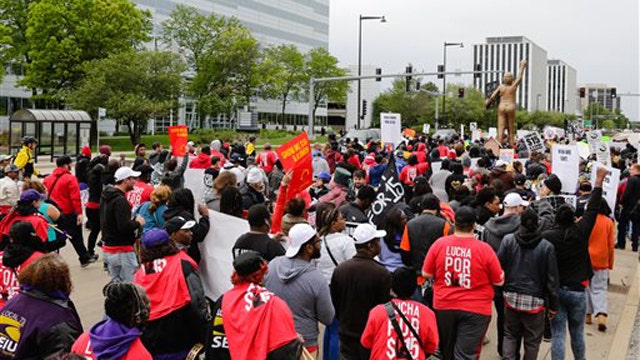Fast food workers across the United States are serving up notice that they want a higher minimum wage and union rights.
Employees at fast food restaurants across the mid-South plan to walk off their jobs and begin protesting on Monday for a $15-an-hour salary, the Detroit Free Press reports.
The fast food employees will be joined by thousands of other workers protesting in two dozen cities across the nation who will show support for the mid-South strikers and the new Poor People’s Campaign.
The protests come on the 50th anniversary of the Memphis sanitation strike.
“Fast-food cooks and cashiers like me are fighting for higher pay and union rights, the same things striking sanitation workers fought for 50 years ago,” Ashley Cathey, a 29-year-old Memphis fast food worker, said, according to the Fight for $15 website. “We’re not striking and marching just to commemorate what they did – we’re carrying their fight forward. And we won’t stop until everyone in this country can be paid $15 an hour and has the right to join a union.”
The events will end with a 1,500-person march from Clayborn Temple to Memphis City Hall, following the same route the striking sanitation workers walked half a century ago. National labor and civil rights leaders will join the demonstrators, as will Memphis sanitation workers who participated in the 1968 event. The Memphis strike started 50 years ago Monday when African-American men protested for union recognition and called for an increase in pay to $2 per hour, or about $15 today, when adjusted for inflation. The deaths of two Memphis sanitation workers—Echol Cole and Robert Walker—who were crushed by a truck’s compactor, spurred the historic strike.
Today, Fight for $15 says politicians have cut minimum wages and attacked unions nationwide, “disproportionately harming workers of color.” The movement says lawmakers such as Illinois Gov. Bruce Rauner, a Republican who has held the position since January 2015, have been attacking union jobs in state and local governments.
"No one can stay in business if a worker can only produce $10 an hour of value but the government forces them to pay their workers $15 an hour."
“To truly defeat systemic racism, poverty, the war economy and ecological devastation, all working people must have the freedom to come together and harness their power collectively,” said the Rev. William Barber II, co-chair of the Poor People’s Campaign: A National Call for a Moral Revival. “Our movements are prepared to do whatever it takes — including taking to the streets and risking arrest through civil disobedience — to win the right to a living wage and a union for all.”
Still, not everyone is onboard with hiking the minimum wage. In a September 2017 Op-Ed piece for Forbes, Hillsdale College professor Gary Wolfram argues: “No one can stay in business if a worker can only produce $10 an hour of value but the government forces them to pay their workers $15 an hour. A pay raise may sound compassionate, but it is not a sustainable option. Once a minimum wage is passed, the cost of producing goods made by unskilled labor will increase. This in turn means that fewer units can be made and that the price of the good itself will also increase. Because of the increased price, fewer units will be sold – which ultimately results in fewer workers being hired.”
Eighteen states announced they would begin 2018 with higher wages, including Alaska, Florida, Minnesota, Missouri, Montana, New Jersey, Ohio and South Dakota, all of whom raised their rates based on the cost of living. Arizona, California, Colorado, Hawaii, Maine, Michigan, New York, Rhode Island, Vermont and Washington increased their minimum wages due to previously approved legislation or ballot initiatives, according to the National Conference of State Legislatures.










































